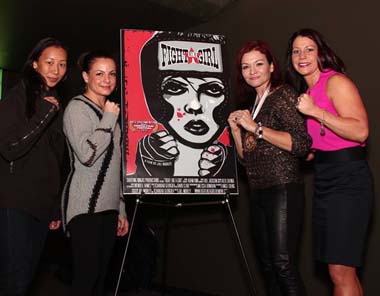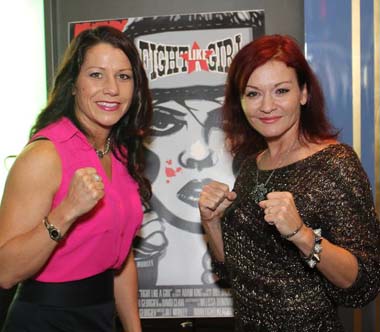(DEC 13) Athletes are, by
definition, unique, a quality that applies to both their
physical and psychic makeup. The sport of boxing takes "unique"
to a further subset of physicality and a psychological strength,
given that the primary purpose of that sport is to render
physical harm to your opponent. And when gender is added to the
equation, "unique" falls far short of an adequate label
describing those female athletes who choose to pursue this most
unforgiving of sports.

Jill Morley's documentary, "Fight
Like A Girl," explores the experiences of four female boxers who
not only compete in the sport in search of achievement in the
ring, but also utilize it as a palliative for overcoming
personal obstacles in their lives, ranging from parental abuse
to racism to depression. Morley's film, which was shown December
6/7 during the second annual "Shadowbox Film Festival" at the
SVA Theatre in New York City, takes viewers up close and
personal with the four boxers, inside and outside the ropes
(Morley is one of the four). The film explores both the range of
ring talents of the four fighters, inter cut with searing, frank
insights into the psyches of the women as they unabashedly
discuss the role boxing has played in overcoming their personal
"demons."
It becomes obvious, from the first scene, that the verb "Fight"
in the title refers both to the four women's battles against
opponents in the ring and also against the obstacles they, and
an untold number of other women, face in their personal lives:
Morley, depression and parental abuse that drove her to the cusp
of suicide; Maureen Shea, physical and mental abuse at the hands
of a boyfriend; Kimberly Tomes racism stemming from her Asian
heritage; Susan Merllucci, anger and alcohol abuse . Shea and
Tomes, at the time of the filming, were professional fighters
while Morley and Merlucci were training for the New York Golden
Gloves, the top amateur tournament in the country.
While over six years has elapsed since the documentary was
filmed, the boxing portion of the film loses little in it's
portrayal of the sport, since boxing, particularly Women's
boxing, has remained in a stasis state through the present time.
Marlucci (now competing under her married name, Susan Reno) and
Shea are still active in the professional ring and Morley
remains a prominent fixture in the boxing community. Tomes had
her last professional fight was in 2007 (boxrec).

Maureen Shea (left) Jill
Morley (right)
The ninety minute film segues
continually between the four women, sometimes to a point of
distraction, tracking their boxing lives in the ring along with
their psychological struggles in equal measures.
Morley is the most honest and uncompromising in detailing her
personal struggles, with expansive input from her husband,
parents, brother and therapist. Shea, who will go, from the time
of the filming, on to a well publicized career in both the sport
and in the media, shows a portend of that future, in the film,
with a lucid and compelling description of both her sport and
her struggles with abuse from a former boyfriend.
Merlucci (nee Reno) projects an
openness that comes across with dazzling sincerity and
translates compellingly on the screen. Her current husband, who,
at the time of the film, was her boyfriend and trainer, is
depicted as playing a significant role both in and out of the
ring. Tomes, whom I wished had gotten a fuller "back story"
treatment in the film, proved once more the sports writing
axiom: "the most interesting stories often come out of the
dressing rooms of those who didn't get the decision." Tomes'
interaction with the redoubtable Melissa Hernandez (in a "steal
the scene" cameo role) as a trainer for Tomes was the highlight,
for me, of the boxing portion of the film. And that, in no way
slights the job Morley did with her extensive coverage of all
four women, training in the gym and competing in the ring. But,
on the subject of cameos, I was a bit puzzled over how Barry
McGuigan, the former Irish featherweight titleholder,
significantly advanced the story, when, he was inserted in the
film for a ninety second treatise of boxing clichés.
That nitpick aside, Morley has made a film well worth watching.
It works on both the levels that she seeks to explore. She
transports the viewer inside a sport that is all too often
misunderstood and far too often misleadingly portrayed in film.
Morley does not fall into any of the common traps of
over-romanticizing and creating fables about the sport and it's
athletes. It's ninety minutes of "down and dirty" analysis of a
sport that is a long reach from pristine and of four women
looking within that sport for personal salvation. Morley views
the sport and women in the ring with a steady, knowledgeable eye
that can only be derived from participatory knowledge gained
inside the ropes. And at the same time, she seamlessly weaves an
unblinking focus on the equally underreported issue of mental
health among female athletes.
Follow Us
